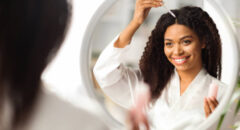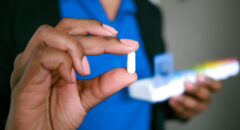
Falls are the second leading cause of accidental death. Seniors are the most at risk for a serious fall because of changes in balance and strength that can come with aging.
Taking a few common sense precautions can help prevent falls and hip fractures. The following basic actions could save your life, prevent a hip fracture and keep you independent longer.
Celebrate great health! LIKE BlackDoctor.org on Facebook!
1. Exercise
When you have osteoporosis, keeping still may seem like the best way to prevent falls and broken bones. But exercise improves strength, flexibility, and balance — which help you stay on your feet. Stick with low-impact activities like walking or swimming rather than sports that require bending and twisting, like golf, or those with a high risk of falling, like skiing. Experts often recommend tai chi.
2. Talk to Your Doctor About Your Meds
Many medicines and medication combinations can make you dangerously drowsy or dizzy. Review everything you’re taking with your doctor. Do you still need all of them? Could you take smaller doses? Should you switch medications? Also, ask about other health conditions that might affect your stability. Vision and ear problems are especially likely to upset your balance.
3. Watch Your Step
Be careful where you step. If a sidewalk looks slippery, walk on the grass. In winter, consider carrying a small bag of salt or kitty litter for traction on icy paths. Highly polished marble or tile floors can be slippery, so try staying on carpet when possible. And look out for uneven surfaces, curbs, and high door thresholds.
4. Be Shoe Smart
Walking barefoot or in socks can increase your risk of falls, so wear shoes even indoors. Choose footwear with low heels and slip-resistant soles. Be sure your shoes fit properly, and use a shoehorn for help putting them on. Women who have trouble finding wide enough athletic shoes might find men’s shoes fit better. Replace slippers that have stretched out and gotten loose. And keep those laces tied!
5. Clear Clutter
Arrange furnishings so that it’s easy to walk around your home. Keep low coffee tables, magazine racks, stools, and plants out of your path. Remove obstacles like boxes, newspapers, or piles of clothing. And make sure electric cords and phone lines are out of the way. Don’t forget your yard — rake leaves to keep walkways clear.
6. Go Slow
At home, take your time getting out of bed or up from a chair. Don’t rush to answer the doorbell or the phone. More accidents happen when you’re in a hurry. When you go out, don’t race for elevators or try to stop them with your arm or leg. Take your time sizing up curbs and steps. There’s no need to hurry.
7. Use Safety Devices
Installing grab bars and rubber mats in the bathroom is just the beginning. Mount handrails on both sides of the stairs. Make sure all area rugs have skid-proof backing. If you must use a stepstool, use a sturdy one with a handrail. Even better, buy a long-handled grasping device to help you reach. Never borrow someone else’s cane or walker. Make sure yours fits you.
8. Keep Things Light
Vision changes as we age, making it harder to avoid obstacles and get oriented in dim light. So keep your rooms bright! Install light switches near the entrances of rooms and at the top and bottom of the stairs. Use lots of nightlights, and keep multiple flashlights handy in case of power outages. Keep curtains and blinds open during the day to let in more light.
9. Watch Out for Pets
Dogs and cats make great companions, but it’s easy for them to get underfoot. Each year, an estimated 21,000 older adults wind up in emergency rooms after tripping over their pets. Don’t let pets sleep directly beside your bed or chair, where they might be in your way. Keep their toys and bowls off walkways. Wipe up spills right away. You may even want to put a bell on your pet’s collar to let you know when he’s close.
10. Limit Your Alcohol
It’s no surprise that heavy drinking can lead to more falls. When you drink, you can be unsteady on your feet. But excessive alcohol also can damage bone health. It can limit the calcium that gets into your bones and make them more brittle and prone to fracture. Thirsty? Have a glass of calcium-rich skim milk, fortified juice, or a smoothie made with low-fat yogurt.
11. Consider Changing Glasses
Bifocals and trifocals can sometimes make it harder to see straight ahead of you. A recent study found that wearing single-lens glasses for walking and outdoor activities reduced falls among older wearers. The American Geriatrics Society also recommends avoiding multifocals for walking, especially on stairs. However, if you’re not very active, going back and forth between glasses might be too disorienting.
12. Learn How to Fall
Even if you do fall, there are ways to reduce your chances of getting hurt. Remember this: Roll, don’t fall! If you start to slip and there’s nothing to grab, take a quick step or two to catch your balance. If there’s no stopping the tumble, drop down and attempt rolling out of the fall. Try to avoid landing on your hip.








